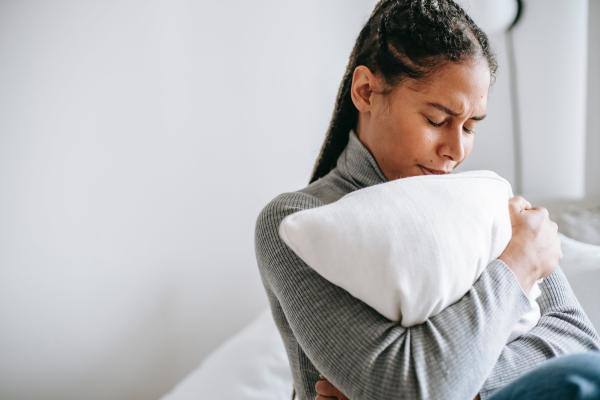Symptoms can vary in intensity in those with endometriosis, and the amount of endometriosis does not always correspond to the amount of pain and discomfort experienced. Not everyone with endometriosis experiences symptoms.
The classic endometriosis symptoms include:
- Pelvic pain
- Painful periods that interfere with everyday life
- Heavy menstrual bleeding
- Pain during or after sex
- Painful bowel movements/when having a poo
- Pain when urinating/peeing
- Difficulty getting pregnant – up to 70% of those with endometriosis will be able to get pregnant naturally
- Fatigue, with one or more of the above symptoms
The following symptoms have also been reported:
| Pain symptoms | Bleeding symptoms | Bowel and bladder symptoms | Other symptoms |
|---|---|---|---|
| Painful periods | Heavy periods with or without clots | Painful bowel movements | Tiredness/lack of energy |
| Pain on ovulation | Prolonged bleeding | Bleeding from the bowel | Depression |
| Pain during an internal examination | 'Spotting' or bleeding between periods | Symptoms of irritable bowel (diarrhoea, constipation, bloating - particularly during your period) | Back pain |
| Pain during or after sex | Heavy periods | Pain when passing urine | Leg pain |
| Pelvic pain | Loss of 'old' or 'dark blood' before period | Pain before or after passing urine or opening bowel |
All of the symptoms above may have other causes and may not necessarily be endometriosis symptoms. It is important to seek medical advice to clarify the cause of any symptoms. If symptoms change after diagnosis it is important to discuss these changes with your doctor. It is easy to relate all problems to endometriosis, but it may not always be the reason.
Period pain – what is normal?
Period pain can be experienced even if you don't have endometriosis, but if pain during your period is interfering with your everyday life, it may be best to consult your doctor.
Most cases of period pain are caused by contractions in the uterus. Blood vessels in the muscle wall are compressed by the contractions, which temporarily cuts off blood supply to the womb, starving it of oxygen and adding to the discomfort. However, in endometriosis the pain is caused by endometrial tissue that has grown outside the uterus. During a period, these endometrial cells break down and bleed. However, this internal bleeding has no way of leaving the body and leads to inflammation, intense pain and a build-up of scar tissue.
Endometriosis is usually characterised by period pain in the days before a period. The periods become typically painful, often meaning days off school, college or work. If period pain is preventing you from carrying out your normal activities, please seek medical advice.
I think I have endometriosis - what should I do?
If you think you have symptoms of endometriosis, it's important that you speak to your doctor. You can find out more on our Getting Diagnosed pages.
To learn more about endometriosis download our Information Pack
Understanding Endometriosis Information Pack
As a charity, Endometriosis UK relies on support from people like you. If you found this page helpful please consider making a donation. Thank you.







